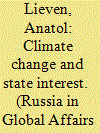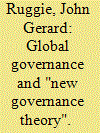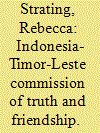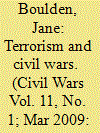| Srl | Item |
| 1 |
ID:
178814


|
|
|
| 2 |
ID:
128859


|
|
|
|
|
| Publication |
2014.
|
| Summary/Abstract |
Does women's empowerment strengthen global good citizenship? We test theories of democratic foreign policy and feminist international relations that suggest that more deeply democratic countries with greater gender equity will be stronger international human rights promoters. First, the direct empowerment of women as policymakers and civil society constituencies may shift states' incentives and ability to pursue international human rights initiatives. Second, greater sexual equality may lead to feminist socialization of the wider society to promote human rights values. We test these predictions by measuring the relationship between five different measures of sexual equality and a country's propensity to support 30 international human rights outcomes, including legal commitments, humanitarian assistance, and sanctions, controlling for previously established contributing factors such as level of development and democratic regime type. We find that more sexually equal countries are more likely to support international commitments to constrain state violence against individuals, international measures to combat gender and sexual orientation discrimination, and more and higher quality development assistance. However, sexual equality appears to yield less benefit for more costly human rights initiatives: yielding sovereignty to international legal institutions, promoting economic rights through concessionary trade policies, or adopting diplomatic sanctions against pariah states. These effects are stronger in democratic states, where citizen empowerment translates more readily into foreign policy, and are also found in a sample that excludes the Western powers.
|
|
|
|
|
|
|
|
|
|
|
|
|
|
|
|
| 3 |
ID:
052210


|
|
|
| 4 |
ID:
129023


|
|
|
|
|
| Publication |
2014.
|
| Summary/Abstract |
On 16 June 2011, the un human rights council unanimously endorsed the Guiding Principles on Business and Human Rights that I developed over the course of the previous six years in my role as the Secretary-General's special representative for business and human rights.1 The journey involved nearly fifty international consultations on five continents, numerous site visits to individual firms and local communities, extensive research, and pilot projects to road test key proposals. For the council and its institutional predecessor, the Commission on Human Rights, the endorsement was unprecedented. It was the first time that the UN adopted a set of standards on the subject of business and human rights; and it remains the only time the commission or council endorsed a normative text on any subject that governments did not negotiate themselves. Moreover, the uptake of the Guiding Principles (GPs) by other standard-setting bodies, national and international, has been swift and widespread, as has their use as a policy template by companies and business associations as well as an advocacy tool by nongovernmental organizations (NGOs) and workers' organizations.2
|
|
|
|
|
|
|
|
|
|
|
|
|
|
|
|
| 5 |
ID:
134032


|
|
|
|
|
| Publication |
2014.
|
| Summary/Abstract |
International justice is characterized by the global articulation of basic human rights and peremptory norms outlawing crimes against humanity. In the twenty-first century, an international obligation of states to pursue individuals who bear responsibility for gross violations of human rights has formalized. Since the 1999 independence referendum, Timor-Leste has struggled to achieve substantive justice for the human rights violations committed during Indonesia's 25-year de facto administration. Timor-Leste provides a unique case study on the international dimensions of pursuing justice in a post-conflict transitional context, particularly as many alleged perpetrators of rights violations have been shielded by Indonesia. This presents a challenge for Timor-Leste in balancing its various international and domestic priorities: while domestic political order and rule of law necessitates the pursuit of substantive justice, Timor-Leste's external security interests require a positive relationship with Indonesia. This article examines the world's first bilateral Truth and Reconciliation Commission, the Indonesia-Timor-Leste Commission of Truth and Friendship. It then analyses the implementation of the Commission's recommendations by Indonesia and Timor-Leste. The paper argues that the Commission was primarily a political mechanism designed to support international priorities rather than substantive justice.
|
|
|
|
|
|
|
|
|
|
|
|
|
|
|
|
| 6 |
ID:
086353


|
|
|
|
|
| Publication |
2009.
|
| Summary/Abstract |
This article reviews the civil war and terrorism literature and then explores the international communities' responses to both. Both the academic literature and the international community tend to approach terrorism and civil war along separate tracks. A key question is whether or not this approach needs to be re-evaluated given the blurring of the distinction between what goes on inside and outside the state when it comes to political violence. If the goal of analysts and the international community is to maintain order, then treating civil wars and terrorism separately may be appropriate. If, however, the goal is to devise more effective means to deal with political violence generally, then the causes of civil war and terrorism must be investigated more closely and the two phenomena must be approached together rather than separately.
|
|
|
|
|
|
|
|
|
|
|
|
|
|
|
|